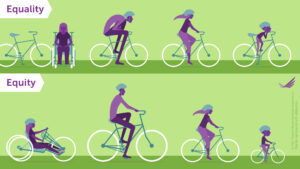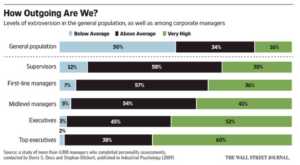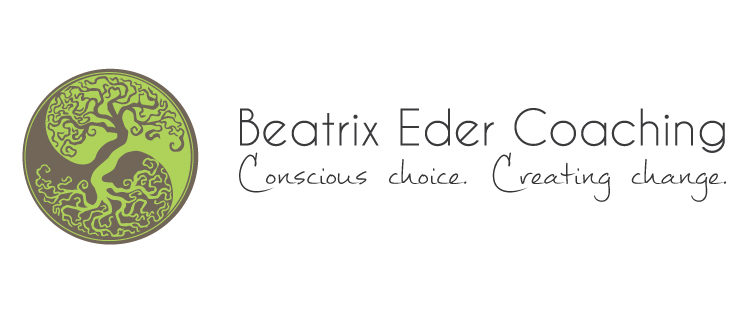
Equity throughout the employee life cycle – part 3
Managing performance and career development - 4 best practices
The understanding that productivity and performance are directly related to employee engagement have been around for quite some time. Engaged employees are focused and committed, working with agility and collaborating efficiently with colleagues, clients and service providers.
When diversity, inclusion and equity are part of an organization’s culture, people of various backgrounds and skillsets feel accepted, welcome, heard and valued. Conversely, when people sense that they are “outsiders”, they can easily feel disconnected and undervalued which will negatively impact their attention, their energy levels and ultimately their drive to stay.
If organizations want retain the diverse talent they have hired and onboarded, they need to make both their performance management practices and their career development more equitable.
What is equity
While the words “equity” and “equality” are often used interchangeably, they are very different in meaning and as highlighted in my previous article they have very different outcomes, especially for people from disadvantaged groups with less power.
Equality gives everyone the same resources and same treatment and is closely linked to the concept of meritocracy.
Organisations and society tend to design policies and processes that are for people of the majority and groups with power. Unfortunately, this attitude maintains exclusionary practices and a playing field that is not level.
If you look at the image below, you see the limitations of equality: while the intention is to be fair, when we give each person the same resources, they will not receive what they truly need.

In comparison, equity recognizes that our individual circumstances are different and in order to ensure fair treatment, equity seeks to distribute resources based on the needs of the recipients.
Equity is often hindered by two elements that mutually influence each other:
- Personal bias: an assumption or opinion with disproportionate weight in favor of OR against a person or group; our biases are both explicit (conscious and overt) and implicit (unconscious and hidden)
- Systemic inequalities: policies, practices and structures that operate both at organizations and within society.
In order to create real change and build inclusive and equitable systems, both elements have to be addressed. If only individual behaviors are changed, we still have the root cause of unresolved structural issues. For example, if a company wants more collaboration but performance reviews are assessed based only on individual performance, change will be very slow.
Managing performance & Career development
When it comes to managing performance in organisations, people often feel that the reviews are merely a bureaucratic exercise to check boxes and that the feedback given is biaised and disconnected from their work.
Despite numerous efforts at companies, people from disempowered groups still find it easier to change the employer in order to get a promotion.
This gives leaders an opportunity to rethink the structures of employee experience and make the core elements more equitable.
Subjectivity and bias can have far-reaching impact
Subjectivity and bias easily tint performance reviews and can negatively influence career prospects.
An example is how decision makers in a company evaluate “readiness” for leadership roles of people who are different from current top executives: Successful leadership is often associated with extraversion and accompanying qualities such as being outspoken, assertive, quick in decision-taking, enjoying being in the center of attention and high tolerance for risk-taking.
This makes introverts dramatically undervalued. People with more quiet personalities, different communication styles or other qualities that make them different from the majority in leadership roles (such as having an accent, being perceived as too young / too old, having young kids to care for etc) can be seen as not ready.
According to a study by Deniz s. Ones and Stephan Dilchert published in the Industrial and Organizational Psychology, introverts and extraverts are about 50/50 in the general population. However, as people advance in their careers, introverts are less and less represented, comprising only 2% of top executive roles.

Such invisible dynamics can dilute the diversity of people being hired and then not being promoted because they do not conform to existing standards of leadership.
4 best practices
With the intention of building more equitable organizations, organizations must develop people who are competent in a broader set of skills than previously. To make performance reviews and career development more effective and inclusive, you might consider these 4 best practices:
Different sources of feedback
As many employees today work in matrix organizations where they report to more than one line manager, collaboration is increasingly important. Ideally, performance reviews should not be relying only on the feedback of the line manager but rather source feedback from diverse people working with the employee, this way giving a more holistic view on their performance and attitudes.
Factors to evaluate
Performance reviews are often seen completely separate from Diversity, Inclusion and Equity. As mentioned above, an organizational culture will only be truly inclusive when structural aspects of the employee experience marry the values and the practiced behaviors.
You might want to consider if your performance review gives highest importance to technical skills and results of performance. If this is the case, the implication can be that behaviors that leave a “trace of blood” are accepted, rewarded and promoted.
Using a Performance Values Matrix helps you visualize not only how well a person is delivering results but it also shows to what extent their behavior is aligned with your organisation’s core values.
Some questions to think about: Are you evaluating
- to what extent an employee practices corporate values?
- how much an employee has collaborated well with members of their team / other departments / clients / suppliers?
- in what ways employees made the workplace more inclusive?
- how did the employee use Diversity, Inclusion and Equity as an enabler to grow the business?
What are unique qualities and skills of this employee? How can they best contribute to what the company needs by using what they naturally are good at and also enjoy?
Conscious use of inclusive language
A recent study found that men are more often evaluated based on their skill set and work results while women based on their personality and likeability. If such habits go unnoticed and unchanged, they reinforce gender roles and hinder women’s career advancement and their retention by their employers.
As the Inclusiver Leader you are, you can challenge yourself to call out situations where you recognize bias, subjectivity or a preference for homogeneity (groupthink).
Is your company continuously training employees at all levels of the organization on bias and the impact of their words?
Are your employees aware how the words they choose reflect their attitudes?
Are they trained in gendered expressions that can hinder women’s career advancement?
Are they educated to recognize situations in which diverse people can feel hurt by a perception of being judged, dismissed, ridiculed and patronized?
Equity lens
Applying an equity lens in performance reviews and career development means that we focus our attention on the impact of our decisions: are we making choices that enable equal opportunity for all people? Or could it be that our choices reinforce structural barriers and deeply ingrained inequalities in power?
As you apply an equity lens in performance reviews, consider these four things:
- What are the needs of the person considering their background, skills and experiences?
- How much are you aware of the cultural and historic context of the person?
- Are you conducting the conversation from a place of openness and possibility, recognizing that it’s not a “one size fits all”?
- To what extent are you informed and aware about subtle forms of exclusion? Are you equipped with actions you can take to address them?
Conclusion: Organisations driving social change
Businesses have an increasingly important role in driving social change and address the many issues the world is facing (climate change, social injustice, poverty, gender equality).
Compared to nations and their governments, organisations have the power to change their system from within: they are autonomous and their leaders have a strong influence over policies, processes and accepted behaviors.
Companies are well aware of the importance of DEI (Diversity Equity Inclusion) and CSR (Corporate Social Responsibility) and how actions in these areas play an important role in the decision-making process of consumers.
Hence, more and more companies make choices that take into account the triple bottom line of people, planet and profit.
Tough many of these DEI & CSR activities are internal to organizations, they have several external effects, stimulating transformational processes across their own offices and spreading across industries, communities and regions.
********************************************
Was this article helpful?
Here are some ways I can support you and your organization:
Get Individual leadership coaching with Beatrix
Deepen and accelerate your learning with one-on-one coaching with Beatrix. Identify and transform patterns and learn new tools that will help you to practice Inclusive Leadership at Work & Home and effectively work with people across differences in identity, experience and power.
Inquire about Individual Coaching here.
Get group coaching with Beatrix
Team coaching is a mid-term process with regular sessions that support a team in an individualized way to improve both the improvement of task-execution as well as the collaborative alliance within the team. The process supports teams to become more cohesive, increase their ability to problem-solve and become more competent in transforming overt and covert conflicts.
Inquire about Group Coaching here.
Book Beatrix for a webinar / workshop / training
Beatrix facilitates virtual and in-person workshops using experiential, interpersonal and reflective activities to share knowledge around Inclusive Leadership, inspire vision, ignite change and build workplaces that are diverse and cohesive. Participants will be supported to embrace new perspectives about differences and translate freshly gained knowledge into concrete actions.
Sessions are customized to your needs and can be delivered in 90-minutes to 3 hours.
Inquire about Webinars and Workshops here.
Get support with Organizational Consulting
Beatrix can help your company to co-create creative and cohesive teams that work effectively in a hybrid work environment, using effective feedback systems, collaborative decision-making processes and respectful communication norms.
Inquire about Organizational Consulting here.



